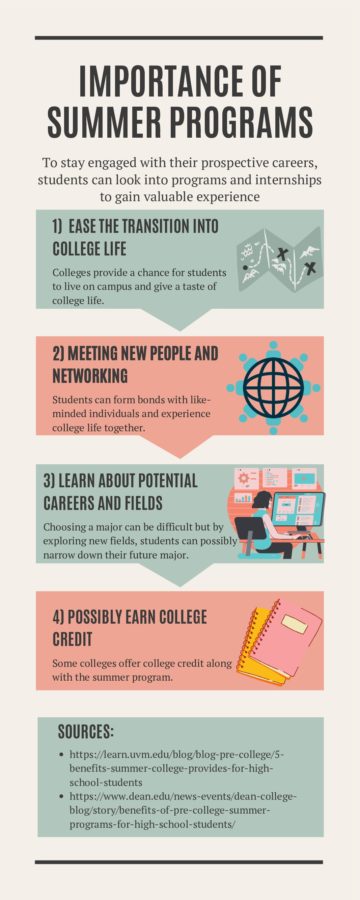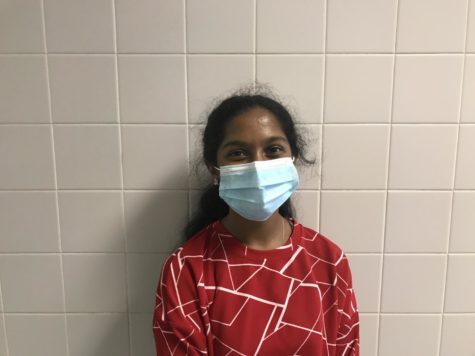Summer programs encourage students to explore professions
March 27, 2022
Wandering the high-rise buildings, sitting alongside like-minded students in the large lecture hall and living in a tiny dorm are experiences that many high school students can look into through the means of college summer programs and internships.. Some high school students search for programs that will keep them engaged with their interests and continue to broaden their knowledge.
According to CollegeBoard, college summer learning programs allow students to gain practical experience in their potential careers and learn about college life. Depending on the course, some programs also offer credit for one’s college degree. Students can apply to courses offered by universities such as Columbia, Cornell, Brown and other institutions.
At Cornell University, students can apply for either in-person, where they can experience college life, or online courses which include astronomy, law and clinical sciences and are taught by Cornell faculty. Application deadlines depend on the course and whether one applies for an in-person program or an online one. Through these experiences, students obtain skills that can be used in future professions and beyond.
“I participated in a 10-week engineering program conducted by UC Berkeley’s Society of Women Engineers called the High School Engineering Program,” junior Shriya Ramaka said.”It was really interesting because I got to learn about the subfields in the engineering world and the different professions one can have.”
At George Washington University, programs range from public policy to biomedical engineering to the arts. Students spend their summer in Washington, D.C. with George Washington faculty who teach them about the rigor of a college environment and the intensive studies that comes with it. There is a $100 application fee with the deadline for session one on April 1, and the deadline for session two on May 1.
“I think it’s important for high school students to get experience from summer programs because it gives them an insight into what a future career would look like,” Ramaka said. “Also, it can give them an edge when they apply for internships in college because [college internships] will be even more competitive then.”
Furthermore, students can look into universities that they possibly want to go to and see if those colleges have programs that fit their interests. To find colleges, Collegeboard has lists out colleges based on majors, locations and academic interests and students can research programs that colleges might have.
Another option for students to learn about their potential career is through internships, which are unpaid professional learning experiences where students can gain new skills in the workplace, according to UMBC. According to CareerLaunchpad, cold calling and emailing companies can possibly open doors to an internship.
“I found that I was often unqualified for internships that I was applying for,” senior Sanjana Subbanna said. “Most internships are found through networking, but I used Indeed and College Vine to look for [internships]” senior Sanajana Subbanna said.
In the College and Career Newsletter written by college and career specialist Khristie Greiner, students can find internships in the fields that they are interested in. The weekly email provides information on possible career options, programs that local organizations offer and ways students can connect with companies in various fields which students can research and reach out to for internships. In some internships, organizations pay high school students to learn and teach them the significance of a work-life balance. Furthermore, it can also potentially present more internship opportunities elsewhere.
“Start with approaching the business or industry you wish to work for someday,” Greiner said. “If you have a good demeanor and are a hard worker, you will be noticed and possibly be asked to come on board for a paid position.”
According to Greiner, colleges see these summer college programs and internships as extracurricular activities, but what one learns from them matters because students are trying to obtain knowledge outside of school. These activities are just one part of the college application, as the transcript is the most critical part of a student’s college application.
“If you put time and effort in [to the program or internship], you will get an experience out of it,” said Greiner. “You will have achieved and learned something. Use that experience to make you a better person.”



